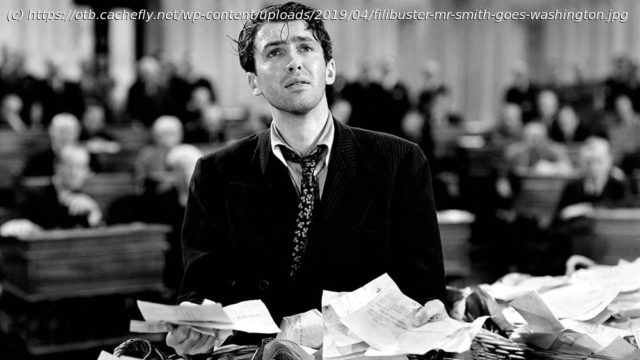It doesn’t work like the movies, Senator.
West Virginia’s senior Senator has taken to the op-ed pages of the Washington Post to declare, “ I will not vote to eliminate or weaken the filibuster.” His reasoning is contradictory and ahistorical. His opening is innocuous enough: When Americans vote to send their two senators to Washington, they trust that they will work to represent the interests of their state on equal footing with 98 other senators. I have always said, “If I can’t go home and explain it, I can’t vote for it.” And I respect that each of my colleagues has the same responsibility to their constituents. Our institutions were built to require compromise and that requires, among other things, a belief that others are acting in good faith. Whether Senators “represent the interests of their state” or “their constituents” at this point, rather than the strategy of their political party, is certainly debatable. It’s no accident that a state as small as West Virginia has the same number of senators as California or Texas. It goes to the heart of what representative government is all about. The Founding Fathers understood that the challenges facing a rural or small state would always be very different from a more populous state. Designating each state with the same number of senators — regardless of the population — ensured that rural and small states and the Americans who live in them would always have a seat at the table. So, while that’s a lie that we tell ourselves, anyone who has taken even elementary school civics knows this isn’t true. Equal representation in the Senate was a result of the Great Compromise, a settlement of an acrimonious fight, not some grand philosophical design. And it had nothing at all to do with the interests of rural voters; the entire country was rural. Urban voters constituted some 5 percent of the population at the time. And, my goodness, having West Virginia’s 1.77 million people have equal representation with California’s 40 million is many things but it is the opposite of “representative government.” The filibuster is a critical tool to protecting that input and our democratic form of government. That is why I have said it before and will say it again to remove any shred of doubt: There is no circumstance in which I will vote to eliminate or weaken the filibuster. So, by sheer accident born of a compromise to solve the particular political squabbles of 13 sovereign equals trying to form a federation out of a confederation in the eighteenth century, rural states are vastly over-represented. That’s incredibly undemocratic. But that’s not enough protection! No, they need to be able to impose supermajority voting requirements on top of that! The time has come to end these political games, and to usher a new era of bipartisanship where we find common ground on the major policy debates facing our nation. This is at least adjacent to what is, in my view, the best argument for the filibuster: a country as diverse as ours shouldn’t enact major changes without broad consensus. If the filibuster worked like it does in the movies, where it forced good-faith compromise to get votes from the opposition, I would likely support it. Alas, for a variety of reasons (see Steven Taylor’s recent posts here and here) it has never really worked that way. Think about the recent history. In 2013, Senate Majority Leader Harry M. Reid (D-Nev.) led the charge to change Senate rules to eliminate the filibuster for Cabinet-level nominees and federal judges. I was one of only three Democratic senators to vote against this rule change. In 2017, Senate Majority Leader Mitch McConnell (R-Ky.) proposed to lower the threshold to end debate on Supreme Court nominees to a simple majority. I voted against that change, too. Despite my votes, both rules changes were enacted and the filibuster was weakened, allowing the majority to more easily enact its agenda with little to no input from the minority. Every time the Senate voted to weaken the filibuster in the past decade, the political dysfunction and gridlock have grown more severe. The political games playing out in the halls of Congress only fuel the hateful rhetoric and violence we see across our country right now.






